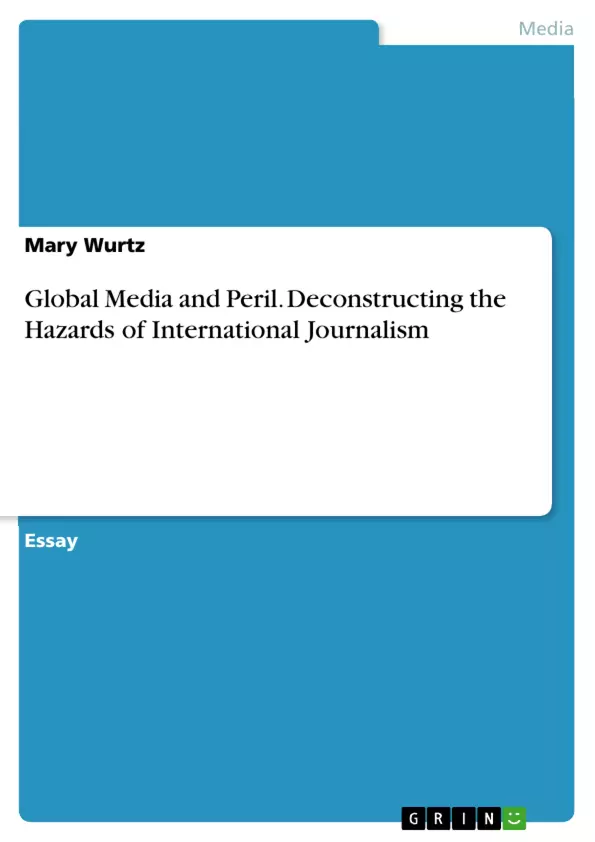A close look at journalistic hazards around the world, what they are caused by, and how they can be resolved.
War, political disruption, crime, and poverty are all part of the chaos that makes up this vast world we know. The public would not be aware of the Syrian crises, nor would we know about the riots persisting in Egypt without the proper documentation made accessible to the common good. The journalists that cover world affairs are the voices of the Syrian refugees, the faces of the Pakistanis that have lost their loved ones to war, and the children suffering from ailments unknown to the United States; they are the eyes and ears of our country.
Inhaltsverzeichnis (Table of Contents)
- Global Media and Peril: Deconstructing the Hazards of International Journalism
- The Threats to International Journalism
- The Role of Political Instability
- The Role of Weak Governments
- The Case of Syria
Zielsetzung und Themenschwerpunkte (Objectives and Key Themes)
This work examines the increasing dangers faced by international journalists, highlighting the various threats they encounter in volatile regions around the world. It aims to shed light on the factors contributing to these risks and the consequences for the journalism profession.
- The growing dangers faced by international journalists
- The impact of political instability on media freedom
- The role of weak governments in suppressing journalism
- The specific case of Syria as a perilous environment for journalists
- The impact of these risks on the future of international journalism
Zusammenfassung der Kapitel (Chapter Summaries)
- The Threats to International Journalism: This chapter details the various risks faced by journalists in conflict zones and other dangerous regions, including killings, kidnappings, and imprisonment. It also discusses the psychological impact of such experiences on journalists, including PTSD and depression.
- The Role of Political Instability: This chapter explores the link between political instability and the persecution of journalists. It examines how political unrest, terrorist activities, and government censorship can create dangerous environments for reporters and limit media freedom.
- The Role of Weak Governments: This chapter examines the impact of weak governments and oppressive regimes on the freedom of the press. It highlights how countries like China, with their control over the internet and censorship practices, pose significant threats to journalists.
- The Case of Syria: This chapter focuses on Syria as a prime example of a country where journalists face extreme danger. It discusses the role of ISIS in targeting journalists, the high rates of kidnappings, and the overall perilous environment for media workers.
Schlüsselwörter (Keywords)
This text examines the dangers faced by international journalists, focusing on the threats they encounter in politically unstable regions. Key topics include political unrest, government censorship, media freedom, and the role of ISIS in targeting journalists. The work highlights the impact of these threats on the safety and well-being of journalists, as well as the implications for the future of the journalism profession.
Frequently Asked Questions
What are the main hazards faced by international journalists?
Journalists in conflict zones face severe risks including killings, kidnappings, imprisonment, and physical violence.
How does political instability affect media freedom?
Political unrest and terrorist activities often lead to government censorship and the active persecution of reporters to control the flow of information.
Why is Syria considered one of the most dangerous places for journalists?
In Syria, journalists are specifically targeted by groups like ISIS, leading to extremely high rates of kidnapping and fatalities.
What role do weak or oppressive governments play in these hazards?
Governments in countries like China use internet control and strict censorship to suppress journalism, posing a significant threat to media independence.
What are the psychological consequences for international journalists?
Many journalists suffering from exposure to war and crime develop long-term issues such as PTSD and clinical depression.
- Citar trabajo
- Mary Wurtz (Autor), 2016, Global Media and Peril. Deconstructing the Hazards of International Journalism, Múnich, GRIN Verlag, https://www.grin.com/document/346320



